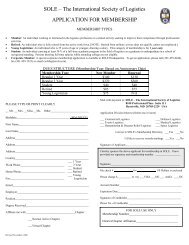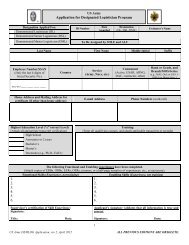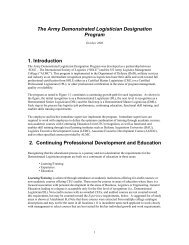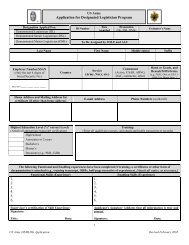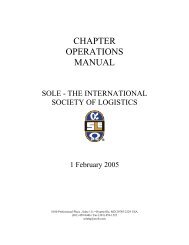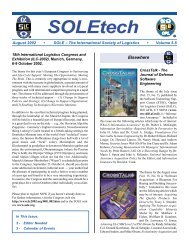The Certified Professional Logistician Program - The International ...
The Certified Professional Logistician Program - The International ...
The Certified Professional Logistician Program - The International ...
You also want an ePaper? Increase the reach of your titles
YUMPU automatically turns print PDFs into web optimized ePapers that Google loves.
Fees<br />
Testing fees - $225 for members and $375 for non-members. Retake<br />
testing fees are $50. All fees must be submitted with application and<br />
are not refundable once the application has been received by the<br />
Qualification Review Board. Cancellation Policy: A $25.00<br />
cancellation fee will be charged if examinee cancels less than 21 days<br />
before the exam date.<br />
<strong>The</strong> <strong>Certified</strong> <strong>Professional</strong> <strong>Logistician</strong><br />
<strong>Program</strong><br />
SOLE - <strong>The</strong> <strong>International</strong> Society of Logistics<br />
Eligibility Requirements<br />
To take the CPL examination, applicants must submit an examination<br />
application showing they meet one of the following eligibility<br />
requirements.<br />
<strong>Professional</strong> Experience - Nine years experience in practicing or<br />
teaching logistics with two years of experience in at least two fields of<br />
logistics.<br />
Educational Equivalents - Each academic year of undergraduate<br />
accredited coursework in logistics subjects equivalent to one year of<br />
professional experience, with undergraduate credits limited to the<br />
equivalent of four years experience.<br />
or<br />
• Bachelor’s degree plus 5 years experience or<br />
• Master’s degree plus 4 years experience or<br />
• Doctoral degree plus 3 years experience<br />
Supporting Documentation<br />
Application for the CPL examination must be accompanied by<br />
supporting documentation such as transcripts, letters of reference,<br />
endorsements and copies of awards and citations. Documentation<br />
requirements are described in the application instructions.<br />
Request for Application<br />
Please contact the CPL Coordinator at SOLE Headquarters by one of<br />
the following methods:<br />
• mail: 8100 <strong>Professional</strong> Place, Suite 111, Hyattsville, MD 20785-2229<br />
• telephone: 301-459-8446, fax: 301-459-1522<br />
• e-mail: solehq@erols.com<br />
®<br />
<strong>The</strong> CPL <strong>Program</strong><br />
<strong>The</strong> practice of logistics is a professional discipline. <strong>The</strong> Society’s<br />
<strong>Professional</strong> Certification <strong>Program</strong> recognizes the professional<br />
stature and ethics of logisticians within commerce, industry, defense,<br />
federal and local government agencies, and both academic and<br />
private institutions. <strong>The</strong> adoption of a certification program in<br />
October 1972 was a major step by SOLE to further the accreditation of<br />
professionals in the logistics field. This certification recognizes the<br />
functional interrelationships within the professional responsibilities<br />
of logisticians regardless of their occupational roles.<br />
<strong>The</strong> title “<strong>Certified</strong> <strong>Professional</strong> <strong>Logistician</strong>” will be granted to<br />
individuals of proven competence in logistics who pass an<br />
examination designed to test their broad knowledge of the entire<br />
logistics spectrum.<br />
<strong>The</strong> Certification <strong>Program</strong> is administered by the <strong>Certified</strong><br />
<strong>Professional</strong> <strong>Logistician</strong> Qualification Review Board (CPL-QRB)<br />
responsible for reviewing the eligibility of applicants, the conduct of<br />
the examination itself, and notifying candidates of the results.<br />
Applications for the CPL examination are available from SOLE<br />
Headquarters by request. Contact information is on the back of this<br />
brochure.<br />
revised October 2006
CPL Certificate<br />
Candidates who successfully pass the certification examination are<br />
awarded a specially designed certificate attesting to the successful<br />
completion of the certification process.<br />
Successful candidates of the certification examination are granted the<br />
designation of “<strong>Certified</strong> <strong>Professional</strong> <strong>Logistician</strong> (CPL)” by SOLE-<br />
<strong>The</strong> <strong>International</strong> Society of Logistics. <strong>The</strong> professional designation<br />
should be used in a dignified manner similar to the recognition<br />
accorded the accounting, medical insurance and other professionals.<br />
Either the full expression or the initials may be used after the<br />
individual’s name on business cards and stationery but always in a<br />
manner consistent with the dignity of the Society. <strong>The</strong> logo may not<br />
be used, except as approved by SOLE Headquarters.<br />
<strong>The</strong> Examination<br />
Examinations are held world-wide twice annually, in May and<br />
November, at announced times and are conducted by a proctor<br />
selected by the administering local SOLE chapter.<br />
<strong>The</strong> examination is conducted during one continuous eight-hour<br />
period, which consists of four two-hour sessions. <strong>The</strong> CPL<br />
examination itself is often ranked as the equivalent of a Masters Degree<br />
for logistics managers and practitioners.<br />
Initially the CPL candidate takes four parts at one time and must pass<br />
all four parts to be certified. If less than three of the four parts are<br />
passed, all four parts must be retaken to qualify as a CPL.<br />
If three parts are passed, the candidate is permitted to retake only the<br />
one part failed but must do so within the next four examination dates.<br />
If the candidate does not successfully pass the remaining part within<br />
that time frame a new application must be submitted and approved,<br />
and all four parts must be retaken.<br />
<strong>The</strong>re is no limit to the number of times an individual may apply to<br />
take or sit for the examination.<br />
Multiple choice questions are used, and the examination is “closed<br />
book.” Only non-programmable calculators are acceptable, and no<br />
reference material other than that authorized by SOLE is permitted in<br />
the testing area. Graded under the auspices of SOLE's Education<br />
Committee, candidates are notified of the results of the examination<br />
by SOLE Headquarters.<br />
Contents of Examination<br />
Systems Management - Concepts of systems and logistics<br />
• System hardware and software<br />
• System life cycle process and phases<br />
• Logistics support, its elements and concepts<br />
• Relationship and integration of systems engineering and logistics<br />
support functions<br />
• System evaluation factors and methodology<br />
Principles and Functions of Management<br />
• Logistics planning and implementation<br />
• Proposals and contract negotiations<br />
• Organization for logistics<br />
• Staffing, directing and controlling<br />
System Design and Development - System engineering<br />
• Conceptual, preliminary system and detailed design<br />
Formal design review<br />
• Conceptual, system, equipment and critical design reviews<br />
System test and evaluation<br />
Acquisition and Production Support - Acquisition of logistics<br />
support resources<br />
• Requirements for support<br />
• Price and source selection<br />
• Provisioning<br />
• Analysis and control<br />
• Production support<br />
• Production requirements, planning, control quality assurance,<br />
plant engineering management and methods<br />
Distribution and Customer Support - Physical supply and<br />
distribution<br />
• Role of distribution<br />
• Material management, packaging, transportation, warehousing<br />
and handling<br />
• Requirements and contracts<br />
• Field engineering and data<br />
Equipment phase-out and disposition<br />
• Phase-out and replacement<br />
• Handling and processing<br />
• Material disposal, reclamation and recycling<br />
revised October 2006



